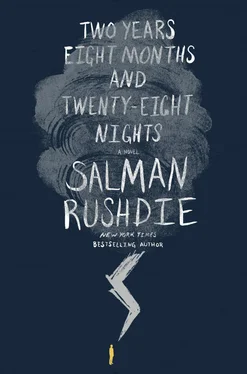The Grand Ifrits’ contempt for their subjects was only increased by the ease with which they recruited human beings to assist them in the maintenance of their new empire. “Greed and fear,” Zumurrud told his three fellow leaders, who met, as was their custom, on a dark cloud circling the earth at the Equator, from which they watched and judged the mere mortals below them, “fear and greed, are the tools by which these insects can be controlled with almost comical ease,” a remark which made Zabardast the Sorcerer laugh loudly, because Zumurrud was well known not to possess anything that even slightly resembled a sense of humor. Zumurrud glared at him with open hostility. The gulf between the two senior Ifrits was growing wider every day. They had patched up their quarrel, made a truce and joined forces again, but trouble continued to rumble between them. They had known one another too long, and their friendship was nearing its end.
Lightning crackled in the heart of the cloud. Ra’im Blood-Drinker and Shining Ruby did their best to change the subject. “What about religion?” asked Blood-Drinker. “What should we do about that? The believers are multiplying down there even faster than before.” Shining Ruby, the self-styled Possessor of Souls, had never had any time for God or heaven. Fairyland was paradise enough and there was no reason to suppose the existence of a higher and better-perfumed garden. Showing a somewhat student-like fondness for proscription, he said, “We should ban it immediately. It’s a circus.”
This remark caused Zumurrud the Great and Zabardast the Sorcerer actually to sizzle with wrath. They crackled at the edges like a hundred eggs frying in a pan, and Shining Ruby and Ra’im Blood-Drinker understood that something had changed in the two senior Ifrits. “What’s the matter with you two?” Blood-Drinker wanted to know. “Since when did you join the halo brigade?”
“Don’t be a fool,” Zabardast told him slyly. “We are in the process of instituting a reign of terror on earth, and there’s only one word that justifies that as far as these savages are concerned: the word of this or that god. In name of a divine entity we can do whatever the hell we like and most of those fools down there will swallow it like a bitter pill.”
“So it’s a strategy, a ruse,” said Shining Ruby. “That, I can understand.”
But now Zumurrud the Great rose up in wrath, and the rage of the huge giant was a little frightening even to his fellow jinn. “There will be no more blasphemy,” he said. “Fear God’s word, or you too will be numbered among its enemies.”
This came as a shock to the other three. “Well, you’re singing a new song,” Blood-Drinker said, refusing to sound impressed. “Who taught you that one?”
“You’ve spent your whole life carousing, killing, gambling, fucking, and then sleeping it off,” added Shining Ruby, “so sainthood sits as uncomfortably on you as that golden crown, which, by the way, is far too small, having been made for a human head which, if you recall, you quite unnecessarily severed from its body.”
“I’ve been studying philosophy,” muttered the giant, reddening, more than a little embarrassed by his admission. “It’s never too late to learn.”
The transformation of the skeptical giant Zumurrud into a soldier for a higher power was the last achievement of the dead philosopher of Tus. Ghazali was dust and the jinni was fire but the thinker in his grave still knew a trick or two. Or, to put it another way: when a being who, all his life, has defined himself by deeds finally opens his ears to words, it isn’t hard to make him accept whichever words you pour into them. Zumurrud had come to him. He was ready to receive what the dead man had to say.
“Every being which begins has a cause for its beginning,” said Ghazali, “and the world is a being which begins; therefore, it possesses a cause for its beginning.”
“That doesn’t include the jinn,” Zumurrud said. “We don’t need a cause.”
“You have mothers and fathers,” said Ghazali. “Therefore you began. Therefore you also are beings who begin. Therefore you must have a cause. It’s a question of language. When the language insists, we can only follow.”
“Language,” Zumurrud repeated slowly.
“Everything boils down to words,” Ghazali said.
“What about God?” Zumurrud, genuinely puzzled, asked at their next encounter. “Didn’t he have a beginning too? If not, where did he spring from? If so, who or what was his cause? Wouldn’t God have to have a God and so on backwards forever?”
“You’re not as stupid as you look,” Ghazali conceded, “but you must understand that your confusion arises, again, out of a problem of language. The term begins supposes the existence of linear time. Both human beings and the jinn live in that time, we have births, lives and deaths, beginnings, middles and endings. God, however, lives in a different kind of time.”
“There’s more than one kind?”
“We live in what can be called Becoming-Time. We are born, we become ourselves, and then, when the Destroyer of Days comes to call, we unbecome, and what’s left is dust. Talkative dust, in my case, but dust nonetheless. God’s time, however, is eternal: it’s just Being-Time. Past, present and future all exist together for him, and so those words, past, present, future, cease to have meaning. Eternal time has neither beginning nor end. It does not move. Nothing begins. Nothing finishes. God, in his time, has neither a dusty end, nor a fat, bright middle, nor a mewling beginning. He just is. ”
“Just is,” Zumurrud repeated doubtfully.
“Yes,” Ghazali confirmed.
“So God is a sort of time traveler,” Zumurrud proposed. “He moves from his kind of time to ours, and by doing so becomes infinitely powerful.”
“If you like,” Ghazali agreed. “Except that he doesn’t become. He still just is. You have to be careful how you use words.”
“Okay,” Zumurrud said, confused again.
“Think about it,” Ghazali urged him.
“This god, Just-Is,” Zumurrud said on a third occasion, after thinking about it, “he doesn’t like being argued with, right?”
“He is essential, that is to say, pure essence, and as such, he is also inarguable, ” Ghazali told him. “The second proposition unavoidably follows the first. To deny his essence would be to call him inessential, which would be to argue with him, who is, by definition, inarguable. Thus to argue with his inarguability is self-evidently to misuse language, and, as I told you, you have to be careful what words you use and how you use them. Bad language can blow up in your face.”
“Like explosives,” Zumurrud said.
“Worse,” Ghazali said. “This is why wrong words are not to be tolerated.”
“I have the feeling,” Zumurrud mused, “that these wretched mortals of the lower world are even more confused about language than I was.”
“Teach them,” Ghazali said. “Teach them the tongue of the divine Just-Is. The instruction should be intensive, severe, even, one could say, fearsome. Remember what I told you about fear. Fear is man’s fate. Man is born afraid, of the dark, of the unknown, of strangers, of failure, and of women. Fear leads him towards faith, not as a cure for fear, but as an acceptance that the fear of God is the natural and proper condition of man’s lot. Teach them to fear the improper use of words. There is no crime the Almighty finds more unforgivable.”
“I can do that,” said Zumurrud the Great. “They’ll be speaking my way soon enough.”
“Not yours, ” Ghazali corrected him, but only mildly. When one was dealing with a Grand Ifrit one had to make certain allowances for his vast egotism.
Читать дальше












